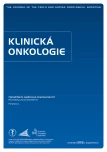-
Medical journals
- Career
The Effect of Prophylactic Mastectomy with Recontruction on Quality of Life in BRCA Positive Women
Authors: Z. Spurná 1; L. Dražan 2; L. Foretová 3; L. Dvorská 1
Authors‘ workplace: Oddělení klinické psychologie, Fakultní nemocnice u sv. Anny v Brně 1; Klinika plastické a estetické chirurgie, Fakultní nemocnice u sv. Anny v Brně 2; Oddělení epidemiologie a genetiky nádorů, Masarykův onkologický ústav, Brno 3
Published in: Klin Onkol 2012; 25(Supplementum): 74-77
Overview
It is presumed that bilateral mastectomy is so far the most efficient way how to prevent development of breast carcinoma among BRCA positive patients. This mutilating intervention might be unacceptable for cosmetic reasons for most women. The purpose of this study was to determine the influence of prophylactic mastectomy on the quality of life of BRCA positive patients by comparing results of psychodiagnostic questionnaire methods before surgical intervention and after it. Our data set consisted of 25 BRCA positive healthy women and 19 BRCA positive women in remission. All these patients underwent a reconstructive surgical intervention after mastectomy. Age of patients was 38–55 years. The following questionnaires were used: Life Satisfaction Questionnaire by J. Fahrenberg, M. Myrtek and E. Brähler, Clinical analysis questionnaire by S. E. Kruge and R. B. Cattel, Impact of Event Scale – Revised by D. S. Weiss and C. R. Marmar.
Results:
Women in remission showed most significant decrease in Financial position category and minor decrease in Work and Employment category and Friends, Acquaintances and Relatives category. Improvement of quality of life was recorded especially in category of Health, Sexuality, Own person, Partnership and in Relationship with own children and there was also a significant improvement to overall life satisfaction. Among healthy patients, there was a significant improvement in category of Health and Own person. Most significant decrease was in dimension of Financial position and Work and employment. Prophylactic mastectomy with reconstruction might be the way of prevention of breast carcinoma because from psychological point of view there is the unambiguously significant fact that there was improvement of perception of own health and own person in both groups of women. These are the quality of life aspects that are considered to be basal and long term stabilizing from the perspective of dynamics of own self and they also systematically influence other aspects of quality of life which are derived from them.Key words:
quality of life – mastectomy – BRCA1 gene – BRCA2 gene – breast cancer – hereditary cancer syndromes
This study was supported by grant of the Ministry of health, number: Ns 10401 – 3/2009.
Autoři deklarují, že v souvislosti s předmětem studie nemají žádné komerční zájmy.
Redakční rada potvrzuje, že rukopis práce splnil ICMJE kritéria pro publikace zasílané do biomedicínských časopisů.Submitted:
4. 5. 2012Accepted:
24. 5. 2012
Sources
1. Cordova M, Giese-Davis J, Golant M et al. Breast Cancer as Trauma: Posttraumatic Stress and Posttraumatic Growth. J Clin Psychol Med Settings 2007; 14 : 308–319.
2. Dražan L. Profylaktická mastektomie a její indikace u rizikových žen. Klin Onkol 2006; 19 (Supp): 97–100.
3. Dražan L, Hýža P, Stupka I et al. Oboustranná rekonstrukce prsů dvěma DIEP laloky. Jak ji hodnotí pacientky? Prakt Lek 2009; 89(6): 306–311.
4. Dražan L, Měšťák J. Rekonstrukce prsu po mastektomii. Praha: Grada 2006.
5. Kebza V. Psychosociální determinanty zdraví. Praha: Academia 2005.
6. Payne J et al. Kvalita života a zdraví. Praha: Triton 2005.
7. Poněšický J. Neurózy, psychosomatická onemocnění a psychoterapie. Praha: Triton 2004.
8. Metcalfe KA, Esplen M, Goel V, Narod SA. Predictors of Quality of Life in Women with a Bilateral Prophylactic Mastectomy. Breast J 2005; 11(1): 65–69.
Labels
Paediatric clinical oncology Surgery Clinical oncology
Article was published inClinical Oncology

2012 Issue Supplementum-
All articles in this issue
- Juvenile Polyposis Syndrome
- Birt-Hogg-Dubé Syndrome
- Hereditary Pheochromocytoma and Paraganglioma
- Hereditary Leiomyomatosis and Renal Cell Cancer – HLRCC / / Multiple Cutaneous and Uterine Leimomyomatosis – MCUL
- The Clinical Importance of a Genetic Analysis of Moderate-Risk Cancer Susceptibility Genes in Breast and Other Cancer Patients from the Czech Republic
- Genetic Counselling in Male Carriers of BRCA1 and BRCA2 Gene Mutations
- The Effect of Prophylactic Mastectomy with Recontruction on Quality of Life in BRCA Positive Women
- Surgical Prevention of Breast Carcinoma in Patients with Hereditary Risk
- Preimplantation Genetic Diagnosis (PGD) of Hereditary Cancer Syndromes
- Evaluation of Variants of Unknown Significance in the BRCA2 gene
- Diagnostics of Breast Cancer in High-Risk Women – Our Own Experience
- Rhabdoid Tumours
- Hereditary Diffuse Gastric Cancer
- Constitutional Mismatch Repair-Deficiency Syndrome (CMMR-D) – a Case Report of a Family with Biallelic MSH6 Mutation
- Clinical Dysmorphic Syndromes with Tumorigenesis
- Li-Fraumeni Syndrome – a Proposal of Complex Prevention Care for Carriers of TP53 Mutation with Total-Body MRI
- Clinical Oncology
- Journal archive
- Current issue
- Online only
- About the journal
Most read in this issue- Birt-Hogg-Dubé Syndrome
- The Clinical Importance of a Genetic Analysis of Moderate-Risk Cancer Susceptibility Genes in Breast and Other Cancer Patients from the Czech Republic
- Hereditary Diffuse Gastric Cancer
- Clinical Dysmorphic Syndromes with Tumorigenesis
Login#ADS_BOTTOM_SCRIPTS#Forgotten passwordEnter the email address that you registered with. We will send you instructions on how to set a new password.
- Career

